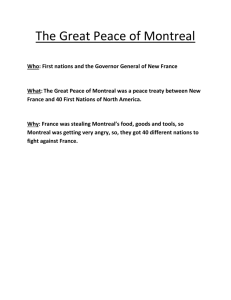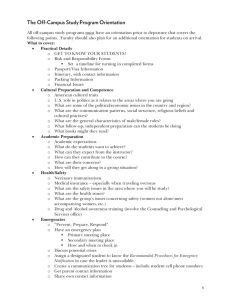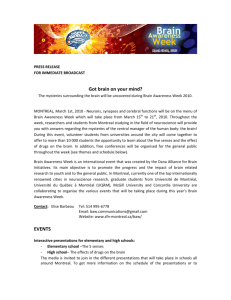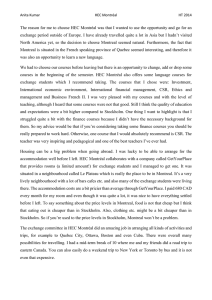PRACTICAL INFORMATION
advertisement
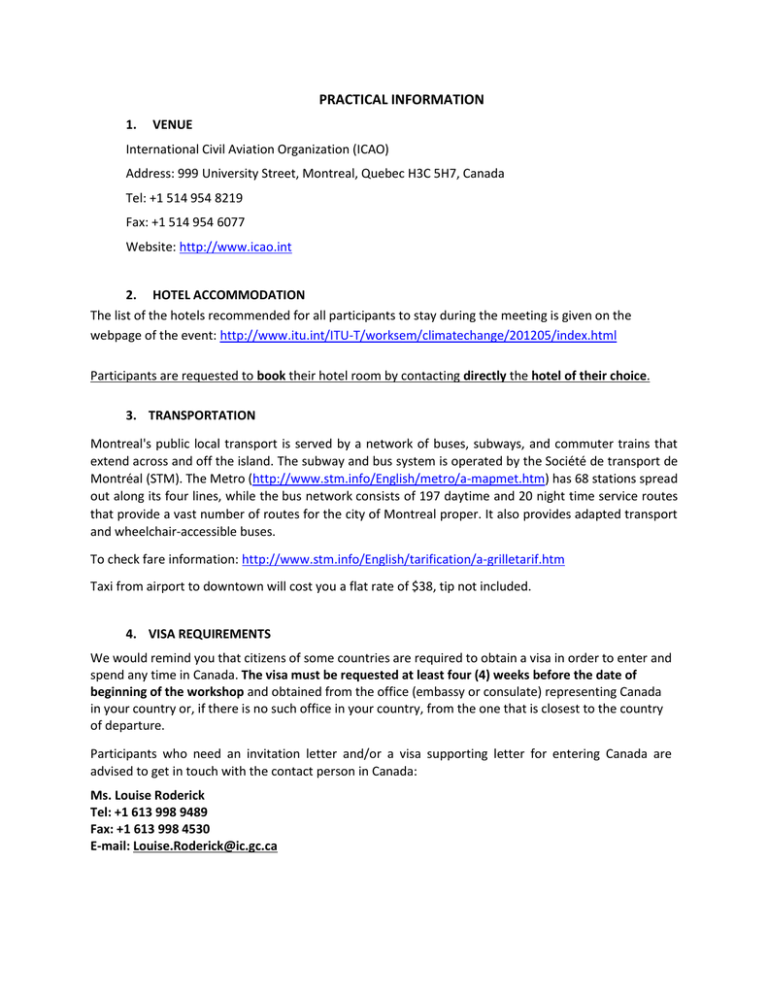
PRACTICAL INFORMATION 1. VENUE International Civil Aviation Organization (ICAO) Address: 999 University Street, Montreal, Quebec H3C 5H7, Canada Tel: +1 514 954 8219 Fax: +1 514 954 6077 Website: http://www.icao.int 2. HOTEL ACCOMMODATION The list of the hotels recommended for all participants to stay during the meeting is given on the webpage of the event: http://www.itu.int/ITU-T/worksem/climatechange/201205/index.html Participants are requested to book their hotel room by contacting directly the hotel of their choice. 3. TRANSPORTATION Montreal's public local transport is served by a network of buses, subways, and commuter trains that extend across and off the island. The subway and bus system is operated by the Société de transport de Montréal (STM). The Metro (http://www.stm.info/English/metro/a-mapmet.htm) has 68 stations spread out along its four lines, while the bus network consists of 197 daytime and 20 night time service routes that provide a vast number of routes for the city of Montreal proper. It also provides adapted transport and wheelchair-accessible buses. To check fare information: http://www.stm.info/English/tarification/a-grilletarif.htm Taxi from airport to downtown will cost you a flat rate of $38, tip not included. 4. VISA REQUIREMENTS We would remind you that citizens of some countries are required to obtain a visa in order to enter and spend any time in Canada. The visa must be requested at least four (4) weeks before the date of beginning of the workshop and obtained from the office (embassy or consulate) representing Canada in your country or, if there is no such office in your country, from the one that is closest to the country of departure. Participants who need an invitation letter and/or a visa supporting letter for entering Canada are advised to get in touch with the contact person in Canada: Ms. Louise Roderick Tel: +1 613 998 9489 Fax: +1 613 998 4530 E-mail: Louise.Roderick@ic.gc.ca To find out more information, please visit Citizenship and Immigration Canada Web site: http://www.cic.gc.ca/. Please note that there are new requirements for American citizens to visit Canada. For more information, please consult the U.S. Department of State Webpage: http://www.state.gov/. 5. PRACTICAL INFORMATION About the country Canada is a North American country consisting of ten provinces and three territories. Located in the northern part of the continent, it extends from the Atlantic Ocean in the east to the Pacific Ocean in the west, and northward into the Arctic Ocean. Spanning over 9.9 million square kilometres, Canada is the world's second-largest country by total area, and its common border with the United States is the longest land border in the world. Canada is a federal state that is governed as a parliamentary democracy and a constitutional monarchy with Queen Elizabeth II as its head of state. It is a bilingual nation with both English and French as official languages at the federal level. One of the world's most highly-developed countries, Canada has a diversified economy that is reliant upon its abundant natural resources and upon trade – particularly with the United States, with which Canada has had a long and complex relationship. It is a member of the G7, G8, G20,NATO, OECD, WTO, Commonwealth of Nations, Francophonie, OAS, APEC, and UN. With the sixthhighest Human Development Indexglobally, Canada has one of the highest standards of living in the world. Time zone The time zone in Montreal is GMT – 04:00. Weather The weather in Montréal varies from -8.9°C (16°F) to 22.3°C (72.1°F) depending on the season, so visitors are encouraged to check the forecast before packing. Below are average monthly temperatures and some Web site links that provide basic weather information to help you plan your visit Average temperature: - May 14.5°C (58.1°F) - June 19.3°C (66.7°F) To find out the temperature in Montréal please visit the Meteorological Service of Canada : http://www.ec.gc.ca/meteo-weather/default.asp?lang=En&n=FDF98F96-1 Electricity Canadian appliances operate on 110 volts (60 Hz), which is identical to the US voltage. A universal adaptor is required for overseas electrical devices. Main wall sockets (or power outlets) and plugs for 110 volts are two parallel flat blades. If those sockets are different from the ones used in your country you will need a socket converter. Vaccination requirements No special immunizations or vaccinations are required to visit Canada. If you're travelling with children, it's always a good idea to ensure they are up-to-date on routine childhood immunizations before international travel. Contact a qualified health professional in your area for more advice. For current travel health information, visit the Public Health Agency of Canada website: http://www.phacaspc.gc.ca/ Local host contact Ms Genevieve Aubin Tel: +1 514 875 0032, ext. 104 Email: gaubin@promptinc.org
